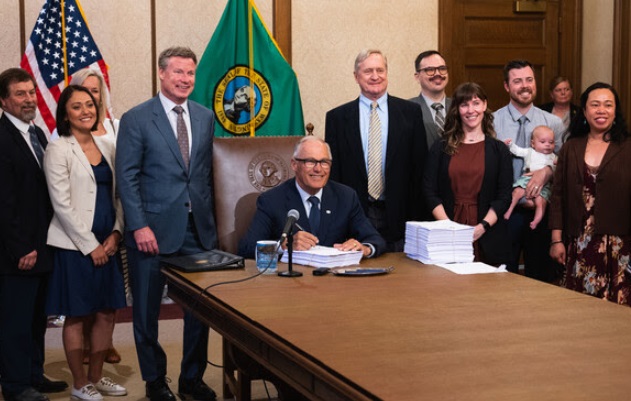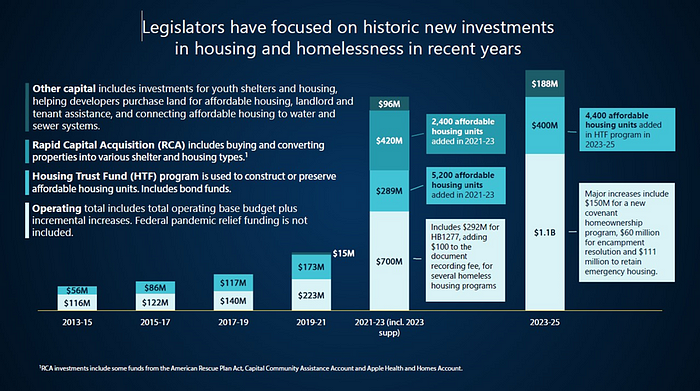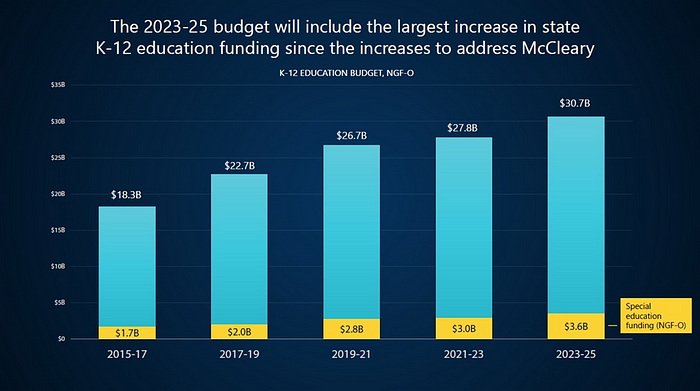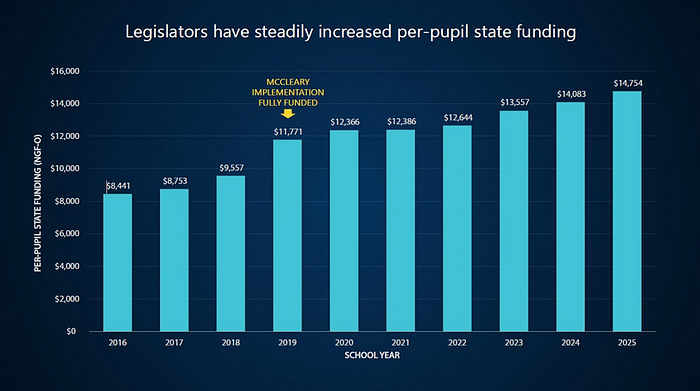
OLYMPIA, WA – Washington State Governor Jay Inslee today signed the new 2023–25 operating, capital, and transportation budgets. The final 2023–25 operating and capital budgets followed many of the priorities Inslee put forward last December, including more than $1 billion for housing and homelessness and urgently-needed funding for behavioral health services.
Inslee also signed the new 2023–25 transportation budget today. While he acknowledged important investments for projects such as the I-5 bridge over the Columbia River, new climate-related investments to electrify the transportation sector, and full funding for the legally-required removal of fish passage barriers, he was unequivocal about his frustration with the final budget.
From Governor’s Office:
To address the scale and speed needed to build more affordable housing, legislators directed historic new investments into the state’s Housing Trust Fund and other affordable housing efforts. Among the investments included in the capital and operating budgets is:
- $400 million Housing Trust Fund funding to add about 4,400 new affordable housing units over the next two years and 13,200 over the next six years, and preserve about 1,000 existing affordable housing units;
- Funding to reduce costs for about 12,000 affordable housing units through the Connecting Housing to Infrastructure state grant;
- Support for the Washington State Housing Finance Commission’s Land Acquisition Program that helps developers purchase land for affordable housing developments;
- $111 million to maintain services and emergency housing and shelter for about 2,000 people;
- Funding to create a new Covenant Homeownership Program that will help hundreds of families from marginalized families become homeowners over the next two years;
- Private sector support from Microsoft, who is providing $50 million for land acquisition for affordable housing.
In addition, the new operating budget includes $60 million to help an additional 300 people currently living in encampments or on state rights of way. Last summer, Inslee launched a new initiative to transition people living in encampments on state rights of way into safer shelters and housing. State agency and nonprofit partners anticipate an estimated 900 people will have moved by the end of June 2023.

The budget also continues investments in urgently-needed behavioral health services around the state. The capital and operating budgets include funding for:
- Continued construction of a new 350-bed forensic hospital on the Western State Hospital campus;
- A new civil commitment facility in Stanwood and a 48-bed residential treatment facility in Vancouver;
- A state contract for 60 beds to provide services for misdemeanor and lower-level felony cases from the forensic admission wait list;
- Five cottages at Maple Lane near Rochester;
- Competency evaluation and restoration services to implement phases 2 and 3 of Trueblood v. DSHS as well a new pilot program for diversion services, additional forensic navigators, and other competency restoration system reforms;
- Strengthening the behavioral health workforce and community behavioral health providers;
- Supports and services for children and youth experiencing a behavioral health crisis;
- Increased access to opioid treatment and prevention services; and
- The first-ever statewide 9–8–8 system behavioral health crisis response system that will include new mobile crisis response teams and seven crisis stabilization facilities.
- Continued investments on projects that expand community-based behavioral health services.
Other budget highlights include:
- K-12 education: Legislators increased funding by $2.9 billion with a focus on special education and continued funding for nurses, counselors and social workers. This is the largest K-12 investment since the McCleary decision.
- Salmon: Final budgets include $732 million to implement the state’s salmon recovery strategy with a focus on protecting and restoring riparian areas along rivers and streams, as well as continued correction of fish passage barriers.
- Climate: The state’s new cap-and-invest program is providing more than $2.1 billion for a range of climate-related investments including charging infrastructure, electric ferries and trucks, grants to improve air quality in overburdened communities, and assistance for lower-income households to transition to heat pumps or weatherize and electrify their homes. Funding was also approved to accelerate siting of clean energy production and transmission projects, reduce emissions from buildings, and assist local governments, Tribes, farmers and others with climate efforts.
- Law enforcement training: Legislators approved funding to build and staff three new regional criminal justice training academies, enabling the state to train 180 more recruits each year. Inslee, legislators and law enforcement leaders recently celebrated the opening of the first new academy in Pasco.


Legislators pass transportation budget that once again underfunds preservation and maintenance and “overpromises” projects that state can deliver
Inslee also signed the new 2023–25 transportation budget on Tuesday. The $13.4 billion budget pays for transportation projects, ferries, safety improvements, maintenance and preservation work across the state. It also provides funding for the Washington State Patrol and departments of Transportation and Licensing.
While Inslee acknowledged important investments for projects such as the I-5 bridge over the Columbia, new climate-related investments to electrify the transportation sector, and full funding for legally-required removal of fish passage barriers, he was unequivocal about his frustration with the final budget.
“Transportation leaders failed in several key areas,” Inslee said at the bill signing. He described how legislators significantly underfunded crucial maintenance and preservation work for things such as pavement upkeep and litter pick-up, and once again overpromised how many projects can be delivered by failing to account for declining gas tax revenues, increased costs, and constraints on contractor and workforce availability.
“I expressed these concerns to transportation leadership last December, and I expressed them again in April,” Inslee said. “I will be signing this budget today out of necessity, but no one should interpret my signature as an endorsement. In the coming months, my office and transportation leaders will need to continue discussions about how to prioritize projects and ensure that maintenance and preservation is adequately accounted for.”

